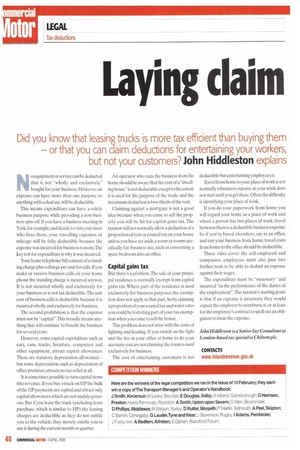Laying claim
Page 40

If you've noticed an error in this article please click here to report it so we can fix it.
Did you know that leasing trucks is more tax efficient than buying them — or that you can claim deductions for entertaining your workers, but not your customers? John Hiddleston explains
No equipment or service can be deducted that is not "wholly and exclusively" bought for your business. However, an expense can have more than one purpose so anything with a dual use will be deductible.
This means expenditure can have a solely business purpose while providing a non-business spin-off. If you have a business meeting in York,for example, and decide to visit your sister who lives there, your travelling expenses or mileage will be fully deductible because the expense was incurred for business reasons.The key test for expenditure is why it was incurred.
Your home telephone bill consists of a standing charge plus a charge per unit for calls. If you make or receive business calls on your home phone the standing charge is incurred anyway. It is not incurred wholly and exclusively for your business so is not tax deductible. The unit cost of business calls is deductible because it is incurred wholly and exclusively for business.
The second prohibition is that the expense must not be "capital".This broadly means anything that will continue to benefit the business for several years.
However, some capital expenditure such as cars, vans, trucks, furniture, computers and other equipment, attract capital allowances. These are statutory depreciation allowances — but some depreciation, such as depreciation of office premises, attracts no tax relief at all.
It is sometimes possible to turn capital items into revenue. If you buy a truck on HP the bulk of the HP payments are capital and attract only capital allowances.which are not unduly generous. But if you lease the truck (excluding lease purchase, which is similar to HP) the leasing charges are deductible as they do not entitle you to the vehicle; they merely entitle you to use it during the current month or quarter. An operator who runs the business from his home should be aware that the rent of a "dwelling house" is not deductible except to the extent it is used for the purpose of the trade, and the maximum deduction is two-thirds of the rent.
Claiming against a mortgage is not a good idea because when you come to sell the property you will be hit for capital gains tax. The taxman will not normally allow a deduction of a proportion of rent or council tax on your house unless you have set aside a room or rooms specifically for business use, such as converting a spare bedroom into an office.
Capital gains tax
But there's a problem. The sale of your principal residence is normally exempt from capital gains tax. Where part of the residence is used exclusively for business purposes the exemption does not apply to that part. So by claiming a proportion of your council tax and water rates you could be forfeiting part of your tax exemption when you come to sell the house.
This problem does not arise with the costs of lighting and heating. If you switch on the light and the fire in your office at home to do your accounts you are not claiming the room is used exclusively for business.
The cost of entertaining customers is not deductible but entertaining employees is.
Travel from home to your place of work is not normally a business expense as your work does not start until you get there. Often the difficulty is identifying your place of work.
If you do your paperwork from home you will regard your home as a place of work and where a person has two places of work, travel between them is a deductible business expense. So if you're based elsewhere, say in an office, and run your business from home, travel costs from home to the office should be deductible.
These rules cover the self-employed and companies; employees must also pass two further tests to be able to deduct an expense against their wages.
The expenditure must be "necessary" and incurred "in the performance of the duties of the employment", The taxman's starting point is that if an expense is necessary they would expect the employer to reimburse it, or at least for the employee's contract to spell out an obligation to incur the expense.
John Hiddleston is a Senior Tax Consultant at London-based tax specialist Chiltern plc.
CONTACTS
www . inland reve nue.g ov. uk
















































































































































































































